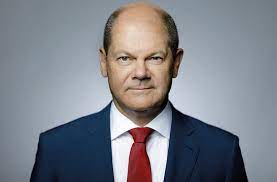
Germany is preventing fellow NATO member Estonia from providing Ukraine with military support by declining to offer export permits for weapons of German origin, The Wall Street Journal reported on Friday.
“Germany, they have a lot of hesitation to deliver to us,” Ukraine’s defense minister, Oleksiy Reznikov, told The Journal.

A German government spokesperson explained to the outlet that the decision on the exportation of weaponry is a result of a long-standing policy.
“The principle governing arms exports is always the same—whether they come directly from Germany or from third countries—and no permission has been issued at this stage,” the spokesperson said, adding that “it is not possible to estimate the outcome of the process at this moment.”

Estonia is lobbying for Germany to change course so that it can send Ukraine D-30 howitzers. The Soviet weapons were left in Germany after its reunification before being exported to Finland and later Estonia, The Wall Street Journal report said.
Unlike other NATO members, including the US and UK, Germany has refused to provide weapons to Ukraine amid tensions with Russia.
Over the past year alone, the US has provided more than $400 million in security assistance to Ukraine. Since 2014, the US has provided Ukraine with Javelin anti-tank missiles, small arms and ammunition, and patrol boats, among other equipment.
But the German government has opposed sending weapons to Ukraine to avoid provoking Russia, while also citing Germany’s own history of atrocities in the region under the Nazis during World War II.
“Our restrictive position is well known and is rooted in history,” Germany’s foreign minister, Annalena Baerbock, said while visiting Kyiv this week.
Ukraine has urged Germany to alter its policy, pushing back against its justifications for declining lethal aid.
“This responsibility should apply to the Ukrainian people, who lost at least 8 million lives during the Nazi occupation of Ukraine,” Ukraine’s ambassador to Germany, Andrij Melnyk, told the DPA news agency, according to Deutsche Welle.
Russia in recent months has gathered tens of thousands of troops near Ukraine’s borders, raising alarm across Europe about the prospect of an invasion. The White House earlier this week said that a Russian invasion of Ukraine could be imminent, and the Biden administration has warned Moscow it will face severe economic consequences in the event of an invasion.
The Kremlin has said Russia has no plans to invade Ukraine while making demands for binding security guarantees that the US and NATO have dismissed as non-starters. Russia, among other things, has insisted that Ukraine and Georgia be barred from ever joining NATO. The alliance has been adamant that its open door policy is not up for negotiation.
Ukraine has sought to join NATO for years and maintains a robust partnership with the alliance despite not being a member. This has angered Russian President Vladimir Putin, who has blamed NATO for the contentious dynamic between Moscow and the West.
Secretary of State Antony Blinken said in Berlin on Wednesday that it is “absurd” to point the finger at NATO, citing Putin’s history of aggression in the region. Russia in 2014 invaded and annexed Crimea from Ukraine. Since that year, the Kremlin has supported separatists in a war against Ukrainian forces in the eastern Donbass region.
Diplomatic efforts to prevent a conflict have not led to any major breakthroughs so far. But Blinken met with Russian Foreign Minister Sergey Lavrov in Geneva on Friday, and they both agreed that it was important to continue diplomatic talks.
As the US searches for a peaceful resolution to the crisis, Germany has been the target of criticism in Washington. Some Republican lawmakers have effectively accused Berlin of abandoning Ukraine in the face of Russian aggression. Nord Stream 2, a Russia-to-Germany gas pipeline, has landed at the center of this discussion.
The pipeline, which is completed but not operational (pending German approval), is opposed by congressional lawmakers on both sides of the aisle as well as the Ukrainian government. The undersea pipeline bypasses Ukraine. Opponents contend the pipeline would give Russia dangerous leverage over Europe, while depriving Ukraine of billions in gas transit fees.
The Biden administration has pushed back against sanctions on the pipeline in order to stay on Berlin’s good side but has also urged Germany to halt Nord Stream 2 should Russia invade Ukraine.
German Chancellor Olaf Scholz has signaled that he is open to this, but he has not explicitly stated that the pipeline would be scrapped as part of a response to a military incursion. Scholz on Tuesday said it is “clear that there will be a high price to pay and that everything will have to be discussed should there be a military intervention in Ukraine.”
Credit: Yahoo News
